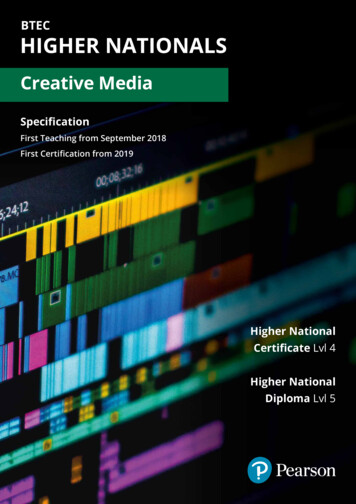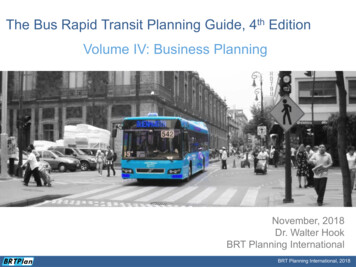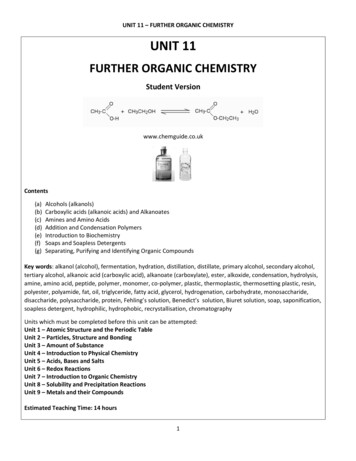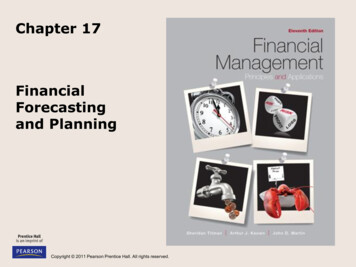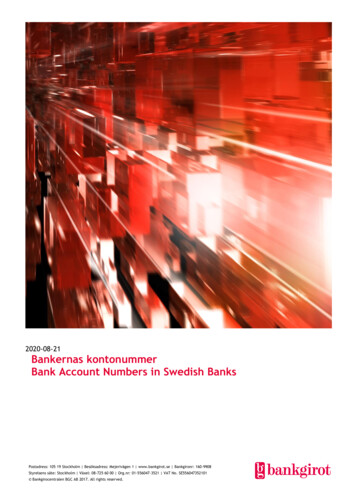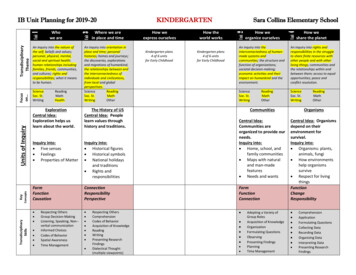
Transcription
KeyTransdisciplinarySkillsConceptsUnits of InquiryFocuson TransdisciplinaryThemeAn inquiry into the nature ofthe self; beliefs and values;personal, physical, mental,social and spiritual health;human relationships includingfamilies, friends, communities,and cultures; rights andresponsibilities; what it meansto be human.ScienceSoc. St.WritingReadingMathHealthAn inquiry into orientation inplace and time; personalhistories; homes and journeys;the discoveries, explorationsand migrations of humankind;the relationships between andthe interconnectedness ofindividuals and civilizations,from local and globalperspectives.ScienceReadingSoc. St.MathWritingOtherExplorationCentral Idea:Exploration helps uslearn about the world.The History of USCentral Idea: Peoplelearn values throughhistory and traditions.Inquiry into: Five senses Feelings Properties of MatterHow weexpress ourselvesHow theworld worksKindergarten plans4 of 6 unitsfor Early ChildhoodKindergarten plans4 of 6 unitsfor Early ChildhoodSara Collins Elementary SchoolHow weorganize ourselvesUnit 4Where we arein place and timeKINDERGARTENUnit 2Unit 1Whowe areUnit 3IB Unit Planning for 2019-20How weshare the planetAn inquiry into theinterconnectedness of humanmade systems andcommunities; the structure andfunction of organizations;societal decision-making;economic activities and theirimpact on humankind and theenvironment.An inquiry into rights andresponsibilities in the struggleto share finite resources withother people and with otherliving things; communities andthe relationships within andbetween them; access to equalopportunities; peace andconflict resolution.ScienceSoc. St.WritingScienceSoc. iesOrganismsInquiry into: Historical figures Historical symbols National holidaysand traditions Rights andresponsibilitiesCentral Idea:Communities areorganized to provide ourneeds.Inquiry into: Home, school, andfamily communities Maps with naturaland man-madefeatures Needs and PerspectiveFormFunctionConnectionCentral Idea: Organismsdepend on theirenvironment forsurvival.Inquiry into: Organisms: plants,animals, fungi How environmentshelp organismssurvive Respect for livingthingsFunctionChangeResponsibility Respecting OthersGroup Decision-MakingListening, Speaking, Non-verbal communicationInformed ChoicesCodes of BehaviorSpatial AwarenessTime Management Respecting OthersComprehensionCodes of BehaviorAcquisition of KnowledgeReadingWritingPresenting ResearchFindingsDialectical Thought(multiple viewpoints) Adopting a Variety ofGroup RolesAcquisition of KnowledgeOrganizationFormulating QuestionsObservingPresenting FindingsPlanningTime Management ComprehensionApplicationFormulating QuestionsCollecting DataRecording DataOrganizing DataInterpreting DataPresenting ResearchFindings
How weorganize ourselvesHow weshare the planetUnit 5How theworld worksUnit 3Unit 2How weexpress ourselvesSara Collins Elementary SchoolTransdisciplinaryThemeWhere we arein place and timeUnit 61st GRADEAn inquiry into the nature ofthe self; beliefs and values;personal, physical, mental,social and spiritual health;human relationships includingfamilies, friends, communities,and cultures; rights andresponsibilities; what it meansto be human.An inquiry into orientation inplace and time; personalhistories; homes and journeys;the discoveries, explorationsand migrations of humankind;the relationships between andthe interconnectedness ofindividuals and civilizations,from local and globalperspectives.An inquiry into the ways inwhich we discover and expressideas, feelings, nature, culture,beliefs and values; the ways inwhich we reflect on, extend andenjoy our creativity; ourappreciation of the aesthetic.An inquiry into the naturalworld and its laws; theinteraction between the naturalworld (physical and biological)and human societies; howhumans use theirunderstanding of scientificprinciples; the impact ofscientific and technologicaladvances on society and on theenvironment.An inquiry into theinterconnectedness of humanmade systems andcommunities; the structure andfunction of organizations;societal decision-making;economic activities and theirimpact on humankind and theenvironment.An inquiry into rights andresponsibilities in the struggleto share finite resources withother people and with otherliving things; communities andthe relationships within andbetween them; access to equalopportunities; peace andconflict resolution.Focuson Unit 1Whowe areUnit 4IB Unit Planning for 2019-20ScienceSoc. St.WritingScienceSoc. St.WritingScienceSoc. St.WritingScienceSoc. St.WritingScienceSoc. St.WritingScienceSoc. lsConceptsUnits of InquiryOf the PeopleReadingMathOtherMany Faces, Global PlacesReadingMathThe ArtsExpress YourselfReadingMathOtherReadingMathOtherAs Time Goes OnIt’s All MaterialReadingMathOtherHere We GrowCentral Idea: Governmentsdefine the roles of peoplein a community.Central Idea: Differentcultures are found aroundthe world.Central Idea: Reading andwriting are forms ofexpression.Central Idea: We organizetime by the cycles of thesun, moon, and earth.Central Idea: The Earthprovides materials to meethuman needs.Central Idea: Plantsprovide vital resources tosustain life.Inquiry into: Organization andfunctions ofgovernment Citizenship Democracy Historical and politicalfiguresInquiry into: Family cultures How people ofdifferent cultures arealike and different Identifying places on amap using symbols &cardinal directionsInquiry into: Fiction and nonfictiontext Features of text Genres IB attitudes expressedthrough literatureInquiry into:Inquiry Into: An Inquiry into: Plant structures, lifecycles and habitats Plant products Environmental effectson mFunctionChange Accepting ResponsibilityRespecting OthersCooperatingGroup ingSafetyInformed Choices Acquisition of KnowledgeAnalysisSynthesisDialectical Thought(multiple points of view)Formulating resenting Research Movement of the Sun, Moon,and EarthProperties of light andshadowsEffects of sunlight on EarthHow technology advances thestudy of Sun, Moon, Planetsand Stars AnalysisDialectical Thought(multiple points of Organizing DataComprehensionFormulating QuestionsObservingCollecting DataRecording DataOrganizing DataInterpreting DataGross MotorSpatial AwarenessTime ManagementComposition of the Earth(land and water)Properties of soil andwaterProperties and uses ofearth materialsProducers & ConsumersNeeds and wantsComprehensionReadingFormulating QuestionsObservingCollecting DataRecording DataInterpreting DataFormulating QuestionsObservingPlanningCollecting DataRecording DataOrganizing DataInterpreting Data
How weorganize ourselvesHow weshare the planetUnit 6How theworld worksUnit 3Unit 3How weexpress ourselvesSara Collins Elementary SchoolTransdisciplinaryThemeWhere we arein place and timeUnit 52nd GRADEAn inquiry into the nature ofthe self; beliefs and values;personal, physical, mental,social and spiritual health;human relationships includingfamilies, friends, communities,and cultures; rights andresponsibilities; what it meansto be human.An inquiry into orientation inplace and time; personalhistories; homes and journeys;the discoveries, explorationsand migrations of humankind;the relationships between andthe interconnectedness ofindividuals and civilizations,from local and globalperspectives.An inquiry into the ways inwhich we discover and expressideas, feelings, nature, culture,beliefs and values; the ways inwhich we reflect on, extendand enjoy our creativity; ourappreciation of the aesthetic.An inquiry into the naturalworld and its laws; theinteraction between thenatural world (physical andbiological) and humansocieties; how humans usetheir understanding ofscientific principles; the impactof scientific and technologicaladvances on society and onthe environment.An inquiry into theinterconnectedness of humanmade systems andcommunities; the structureand function of organizations;societal decision-making;economic activities and theirimpact on humankind and theenvironment.An inquiry into rights andresponsibilities in the struggleto share finite resources withother people and with otherliving things; communities andthe relationships within andbetween them; access to equalopportunities; peace andconflict resolution.Focuson Unit 2Whowe areUnit 1IB Unit Planning for 2019-20ScienceSoc. St.WritingScienceSoc. St.WritingScienceSoc. St.WritingScienceSoc. St.WritingScienceSoc. St.WritingScienceSoc. lsConceptsUnits of InquiryGovernmentCentral Idea:Human beliefs and valuesshape government.Inquiry into: Rules and laws Local, state, andfederal government Making and enforcinglaws Taxes Roles of leadersReadingMathOtherGeography ofCommunitiesCentral Idea:Geography influences thedevelopment ofcommunities.ReadingMathThe ArtsCulture and LiteratureReadingMathOtherScientific rdependenceCentral Idea: Diversecultures contribute to anation’s heritage.Central Idea: The naturalworld and its laws producechange.Central Idea: Humanchoices direct oureconomy.Central Idea: Humansinfluence the environmentof all living things.Inquiry into:Inquiry into: Physical andenvironmentalchanges Properties of matter Weather and seasonalpatterns Magnets and motionInquiry into: Goods and services Producers andconsumers Supply and demand How human choicesinfluence theeconomyInquiry into: Classification ofanimals Life cycles Animal adaptations Habitats Interdependence ofhumans and animalsInquiry into: Map skills/Landforms Urban, rural,suburban How communitieschange over time Changes in our localcommunity ngeResponsibility Respecting OthersCooperatingResolving ConflictGroup Decision-MakingVariety of Group RolesDialectical ThoughtSafetyCodes of BehaviorRespecting OthersAcquisition of ing QuestionsGross motor/fine motorSpatial Awareness Beliefs, customs, andlanguage in literatureCultural contributionsby regionsRecalling stories andmusic from variouscultures related to ournationRespecting OthersResolving ConflictDialectical Thought(many points of view)Listening/Rdg/WritingPresenting ResearchFindings Comp./ApplicationListening/SpeakingFormulating QuestionsObserving, Collecting,Recording, OrganizingDataPresenting ResearchFine MotorSafety/Informed Choices Accepting ResponsibilityAnalysis, Synthesis, andEvaluationMetacognitionFormulating QuestionsPlanning Acquisition of KnowledgeComprehensionAnalysis, EvaluationNon-verbal CommunicationFormulating QuestionsCollecting Data, Recording,Organizing, InterpretingPresenting Research
How weorganize ourselvesHow weshare the planetUnit 1How theworld worksUnit 3Unit 5How weexpress ourselvesSara Collins Elementary SchoolTransdisciplinaryThemeWhere we arein place and timeUnit 63rd GRADEAn inquiry into the nature ofthe self; beliefs and values;personal, physical, mental,social and spiritual health;human relationships includingfamilies, friends, communities,and cultures; rights andresponsibilities; what it meansto be human.An inquiry into orientation inplace and time; personalhistories; homes and journeys;the discoveries, explorationsand migrations of humankind;the relationships between andthe interconnectedness ofindividuals and civilizations,from local and globalperspectives.An inquiry into the ways inwhich we discover and expressideas, feelings, nature, culture,beliefs and values; the ways inwhich we reflect on, extend andenjoy our creativity; ourappreciation of the aesthetic.An inquiry into the naturalworld and its laws; theinteraction between thenatural world (physical andbiological) and humansocieties; how humans usetheir understanding of scientificprinciples; the impact ofscientific and technologicaladvances on society and on theenvironment.An inquiry into theinterconnectedness of humanmade systems andcommunities; the structure andfunction of organizations;societal decision-making;economic activities and theirimpact on humankind and theenvironment.An inquiry into rights andresponsibilities in the struggle toshare finite resources with otherpeople and with other livingthings; communities and therelationships within andbetween them; access to equalopportunities; peace andconflict resolution.Focuson Unit 2Whowe areUnit 4IB Unit Planning for 2019-20ScienceSoc. St.WritingScienceSoc. St.WritingScienceSoc. St.WritingScienceSoc. St.WritingScienceSoc. St.WritingScienceSoc. lsConceptsUnits of InquiryRollin’ Through theRegionsReadingMathOtherUs vs. ThemReadingMathThe ArtsRhythm and Rhyme!ReadingMathOtherScience MattersReadingMathOtherReadingMathOtherDeep in Our RootsThe Domino EffectCentral Idea: Conflictschange how and wherepeople live.Central Idea: People canexpress themselvesthrough poetry.Central Idea: Math helpsus understand physicalscience.Central Idea: Manydifferent groups of peopleimpact today’s culture.Central Idea: Changes in thenatural world create adomino effect.Inquiry into: Land and waterfeatures in SC & World Characteristics of aregion How inhabitants useland featuresInquiry into: Structures ofgovernment Conflicts betweengroups of people Differences inconflicting points ofview Positive and/ornegative effects ofconflictsInquiry into: Individual expressionthrough poetry Various forms andstyles of poetry How poets use poeticdevices tocommunicate ideasand experiencesInquiry into: Classifying matter Changes in matter Transfer and path ofenergy Properties of magnetsand electromagnets Measuring matterInquiry into: Why people settle andstay in an area How merging peoplegroups cause culturesto change How cultural change isevident todayInquiry into: How organisms aredependent uponnatural and unnaturaloccurrences in theirhabitats Characteristics ofhabitats Physical and behavioraladaptations of plantsand ectionCausation Central Idea: Landfeatures affect inhabitants. Respecting OthersGroup Decision-MakingAdopting a Variety ofGroup RolesAnalysisSpeakingWriting Resolving ConflictAcquisition of KnowledgeComprehensionDialectical Thought(multiple nicationGross ening/SpeakingReading/WritingCooperatingGroup Interpreting DataPresenting ResearchAccepting ResponsibilityAcquisition of rmulating QuestionsCollecting DataOrganization/Time Mgmt.Safety SynthesisFormulating QuestionsObservingPlanningCollecting, Recording,Organizing, andInterpreting DataPresenting ResearchFindings
How weorganize ourselvesHow weshare the planetUnit 5How theworld worksUnit 4Unit 1How weexpress ourselvesSara Collins Elementary SchoolTransdisciplinaryThemeWhere we arein place and timeUnit 34th GRADEAn inquiry into the nature ofthe self; beliefs and values;personal, physical, mental,social and spiritual health;human relationships includingfamilies, friends, communities,and cultures; rights andresponsibilities; what it meansto be human.An inquiry into orientation inplace and time; personalhistories; homes and journeys;the discoveries, explorationsand migrations of humankind;the relationships between andthe interconnectedness ofindividuals and civilizations,from local and globalperspectives.An inquiry into the ways inwhich we discover and expressideas, feelings, nature, culture,beliefs and values; the ways inwhich we reflect on, extend andenjoy our creativity; ourappreciation of the aesthetic.An inquiry into the naturalworld and its laws; theinteraction between the naturalworld (physical and biological)and human societies; howhumans use theirunderstanding of scientificprinciples; the impact ofscientific and technologicaladvances on society and on theenvironment.An inquiry into theinterconnectedness of humanmade systems andcommunities; the structure andfunction of organizations;societal decision-making;economic activities and theirimpact on humankind and theenvironment.An inquiry into rights andresponsibilities in the struggleto share finite resources withother people and with otherliving things; communities andthe relationships within andbetween them; access to equalopportunities; peace andconflict resolution.Focuson Unit 6Whowe areUnit 2IB Unit Planning for 2019-20ScienceSoc. St.WritingScienceSoc. St.WritingScienceSoc. St.WritingScienceSoc. St.WritingScienceSoc. St.WritingScienceSoc. lsConceptsUnits of InquiryWhat’s Your Story?ReadingMathOtherAre We There Yet?ReadingMathOtherKwe’Kwe’, Bonjour, Hola,Hallo, Hello!Central Idea: Everygeneration has a story totell.Central Idea: Explorationchanges history.Inquiry into: Telling stories fromhistory (primary andsecondary sources) Telling stories of ourpeople (interviews andfirst-person accounts) Telling our own stories(current events)Inquiry into: Character traits ofexplorers Reasons peopleexplore Consequences ofexplorationInquiry into: Elements of culture How people groupsexpress culturedifferently Effects of geography(place, climate, etc.) onculture Effects of culture onhistory (traditions,conflicts, etc.)Change, onnection Acquisition of KnowledgeDialectical ThoughtMetacognitionWritingFormulating QuestionsAccepting ResponsibilityRespecting OthersAcquisition of dingMathOtherEnergy MattersReadingMathOtherPower for the People!ReadingMathOtherOn the Move!Central Idea: Humans andanimals migrate to meettheir needs.Central Idea: Wave energyhelps people communicate.Central Idea: People holdpower to change society.Inquiry into: Properties of light andsound How light and soundinteract with thephysical world Using energy tocommunicateInquiry into: The power ofgovernment The power ofpersuasion Shifts in powerstructuresInquiry into: Reasons people andanimals migrate Migration cycles andevents Impact of ion Central Idea: Evidence ofcultural expressions can betraced through time.CooperatingGroup Decision-MakingAdopting Variety of RolesDialectical ThoughtOrganizationTime ManagementPresenting Research ing QuestionsCollecting/OrganizingDataPresenting ResearchAccepting ResponsibilityAnalysis & SynthesisEvaluationWritingFine MotorInformed Choices CooperatingResolving ConflictGroup Decision-MakingAdopting a Variety ofGroup RolesListening/SpeakingReading/Writing
Units of InquiryFocuson TransdisciplinaryThemeKeyConceptsHow weorganize ourselvesHow weshare the planetUnit 4How theworld worksUnit 5How weexpress ourselvesUnit 3Where we arein place and timeSara Collins Elementary SchoolAn inquiry into the nature ofthe self; beliefs and values;personal, physical, mental,social and spiritual health;human relationships includingfamilies, friends, communities,and cultures; rights andresponsibilities; what it meansto be human.An inquiry into orientation inplace and time; personalhistories; homes and journeys;the discoveries, explorationsand migrations of humankind;the relationships between andthe interconnectedness ofindividuals and civilizations,from local and globalperspectives.An inquiry into the ways inwhich we discover and expressideas, feelings, nature, culture,beliefs and values; the ways inwhich we reflect on, extend andenjoy our creativity; ourappreciation of the aesthetic.An inquiry into the naturalworld and its laws; theinteraction between thenatural world (physical andbiological) and humansocieties; how humans usetheir understanding of scientificprinciples; the impact ofscientific and technologicaladvances on society and on theenvironment.An inquiry into theinterconnectedness of humanmade systems andcommunities; the structure andfunction of organizations;societal decision-making;economic activities and theirimpact on humankind and theenvironment.An inquiry into rights andresponsibilities in the struggleto share finite resources withother people and with otherliving things; communities andthe relationships within andbetween them; access to equalopportunities; peace andconflict resolution.ScienceSoc. St.WritingScienceSoc. St.WritingScienceSoc. St.WritingScienceSoc. St.WritingScienceSoc. St.WritingCentral Idea:Action activates reaction.ReadingMathOther5th Grade Exhibition:Goodbye! I Must Be LeavingScienceReadingSoc. St.MathWritingVisualMediaMore Than Meets the EyeCentral Idea:The Exhibition planner willbe created by the 5th gradeclass later in the 2017-2018school year.Central Idea: Movement ofpeople creates problemsand solutions.Central Idea:Images express a variety ofperspectives on history.Inquiry into:Inquiry into: How the samesituation or event canviewed differently How images revealvarious perspectives ofhistory How imagescommunicatedifferently than text Inquiry into: TransdisciplinarySkills5th GRADEUnit 1Unit 6Whowe areUnit 2IB Unit Planning for 2019-20ReadingMathOtherHow the movement ofpeople affects culture andplace in a nationHow a nation’s heritagereflects the influence ofother culturesHow political andgovernmental systemsinfluence the movementof peopleReadingMathOtherWhat’s the Driving Force?ReadingMathOtherReadingMathOtherFollow the Leader?EcosystemsCentral Idea: Leadersinfluence and impact thelives of citizens and society.Central Idea:Interdependence within anecosystem is essential fororganisms’ survival.Inquiry into: Opposing forces, bothsocial and political Laws of physics (forceand motion) How policies andtechnologies empowernations(Case Study: 20thcentury United States)Inquiry into: Political, cultural, andpersonal leaders Qualities of leaders Positive and negativeinfluences/impacts Responsibilities ofcitizensInquiry into: Dependence/Codependence oforganisms Influence of nature vs.nurture Man’s influence onrelationships in ngeConnectionResponsibility ApplicationEvaluationSpeaking/ReadingFormulating QuestionsOrganizing, InterpretingDataPresenting ResearchOrganizationTime Management Resolving ConflictGroup Decision-MakingAdopting a Variety ofGroup RolesAcquisition of nverbal Communication Adopting a Variety ofGroup RolesAnalysisEvaluationDialectical Thought(multiple rmulating QuestionsObservingPlanningOrganizing DataFine MotorAccepting ResponsibilityResolving ConflictAcquisition of KnowledgeAnalysis, EvaluationDialectical nCollecting, Interpreting DataPresenting ResearchAccepting ResponsibilityRespecting OthersComprehensionAnalysisFormulating QuestionsObserving, Collecting,Organizing DataGross MotorSpatial AwarenessInformed Choices
Kindergarten plans 4 of 6 units for Early Childhood Kindergarten plans 4 of 6 units the interconnectedness of human-made systems and . survival. Inquiry into: Organisms: plants, animals, fungi How environments



